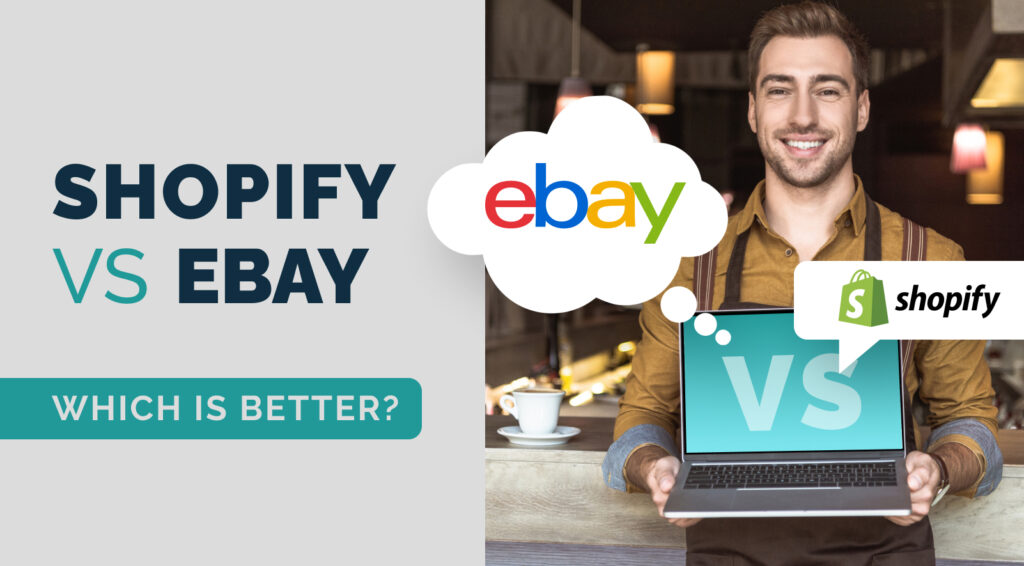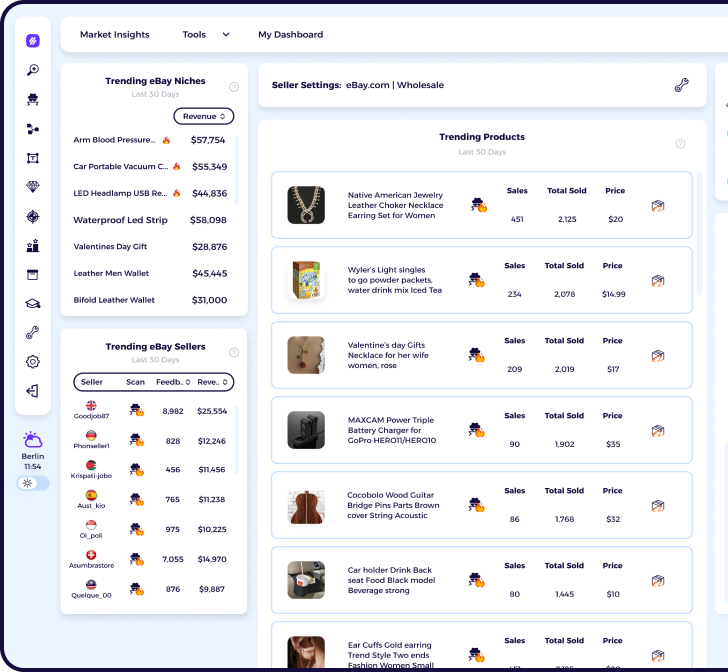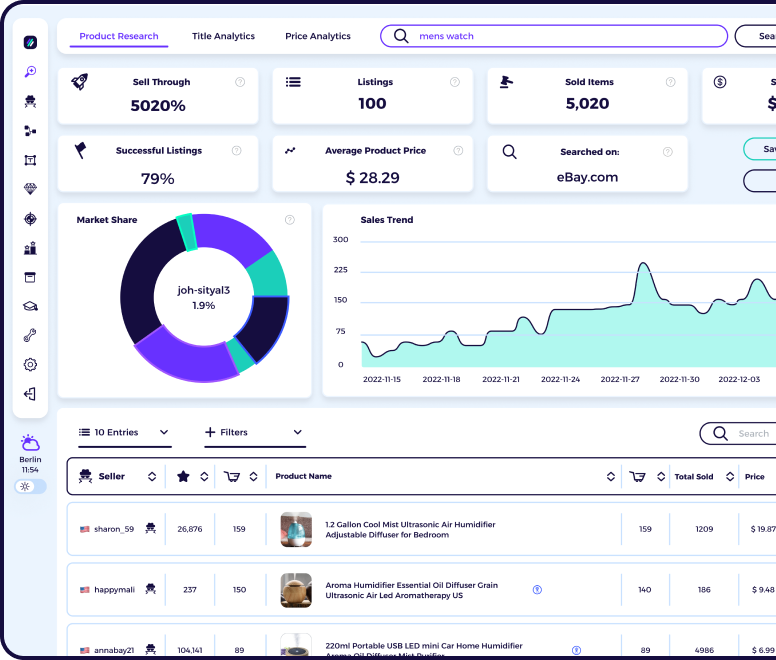As an aspiring online business owner, the most challenging part of running your business is often deciding where and how to start.
I get it – been there, done that!
However, it’sIt’s overwhelming when you look for tips on how to build your online store; information overload is real!
The goal of this article is not to swarm you with more information; instead, I hope to clarify things for you so you can be more confident to start that dream online business and be on your way to financial freedom!
But before you get there, first, you must know how and where to set up your online store.
It’s one of the first decisions you must make, as it can impact your profit potential and your chances for success with online selling.
Two platforms emerge as the top options for your ecommerce business: Shopify vs eBay. So which is the better choice of ecommerce platform to sell products online?
Your decision can set you up for success, so it’s important to make the right one from the start!
Let’s dive in!
Article Overview
How to Set Up a Shopify Store
Shopify is one of the most popular ecommerce platforms for anyone looking to build an online store. It’s where aspiring online stores and owners can set up their digital version of a brick and mortar shop.
This service follows a subscription-based system requiring a monthly service fee to operate your Shopify store and sell goods online.
A Shopify store is the closest to having your own branded online store. It simplifies and streamlines the process of selling online, such as buying a custom domain, branding, designing products and landing pages, processing customer orders, and receiving payments.
Shopify offers a ton of features that enable online store customization options possible. In addition, the ecommerce platform features a user-friendly interface where you can see your orders, communicate with customers, and manage payments.
You can even access store analytics to know how well you’re doing and which products are most profitable in your online stores.
The store customization options for the themes are another reason why many aspiring entrepreneurs and SMEs use Shopify. You won’t need to worry about an external hosting solution since Shopify does that.
It’s an excellent tool for those new to setting up an online business or an ecommerce storefront. Without worrying about the technicalities of setting up your ecommerce business, you can focus on the business side of things.
You can also access advanced Shopify tools and features that maximize performance while selling online. Here are some features you can take advantage of that Shopify merchants can enjoy.
- Shopify Shipping – A built-in solution to help Shopify merchants overcome the common issues surrounding shipping ecommerce business orders is called Shopify Shipping. It is only available to Shopify store owners in the US, Canada, and Australia. It’s a one-stop solution that lets you compare rates between various shipping services, enables you to print shipping labels, and has access to discount codes and shipment tracking data. Online store owners even have access to discounted rates!
- Shopify App Store – The Shopify app store is another feature exclusively available to Shopify store owners. This killer app store provides Shopify store owners access to various apps that would make it easier to run and optimize your ecommerce business. For example, there’s Shopify Chat to talk to your customers in real-time or Veeqo if you manage inventories across different sales channels. Whatever app you need to optimize your online business performance, you’re sure to find it in the Shopify app store!
- Shopify Pricing – Shopify store owners can select from various pricing models to suit their budgets and business goals. The most basic level is called Basic Shopify, which costs $19 a month for an annual plan and is ideal for those starting their ecommerce business. The next one is Shopify, which costs $49 monthly for an annual plan. It gives you access to more staff accounts, advanced reporting, shipping, gift cards, and more. Finally, Advanced Shopify is available for $299 a month for an annual plan. It provides store owners access to all of the available features on the ecommerce platform.
In addition to the store subscription levels mentioned above, you can upgrade your account to Shopify Plus.
It is the ideal plan for high-volume Shopify merchants or enterprises. Meanwhile, Shopify Lite is available for $9 monthly to add products to your website or interact with customers through the Facebook Messenger app.
Shopify Store Benefits
Now that you know what it takes to set up and run an online store through Shopify, the next step is to weigh the pros and cons of choosing this platform to sell products online. Here are the benefits of setting up your online stores through Shopify.
User-Friendly Interface
Even if it’s your first time setting up an ecommerce store, you wouldn’t have difficulty with the setup process since the interface and dashboard of Shopify are simplified and streamlined. It makes it easy to use and navigate.
You don’t need to have technical know-how to be able to get your online stores up and running.
Store Customization
Shopify offers various customization options and themes to make your store stand out. It’s also your ticket to creating your own branded online store without the hassle (and cost!) of building your website from scratch!
Even if you have no coding skills, you can make your online store unique from others.
App Integrations
Shopify users have access to a huge app store that can help optimize your ecommerce sales. You must use Shopify’s app store and integration capabilities to manage inventory, deliver customer support, or market your products online.
The killer app store on Shopify offers a tool for just about anything you need!
24/7 Support
The customer support Shopify offers is another distinct advantage of setting up your ecommerce business through this platform.
You can access customer support via email, live chat, or phone. They are highly responsive, so you can guarantee someone is available when you have questions or issues.
Payment Processing
A built-in payment processing in Shopify makes it easy to accept payments from customers, such as credit card payments, without using third-party apps for payments.
Scalability
Shopify store owners can choose from varying levels of subscriptions to suit their budget and online store goals. Make sure to choose the right level to match your payments with the volume of ecommerce sales you’re generating and still profit from those sales.
If you start getting more sales, you can upgrade your subscription accordingly.
Security
Web security is paramount to any online business, especially if you’re a starting entrepreneur.
Unfortunately, it’s challenging to build your online business website from scratch since you have to pay for a suitable domain and web host to ensure the security of your products and customer information.
With Shopify, you can leverage the platform’s built-in web security protocols to protect your ecommerce business and customers.
Multi-Channel Shopping
Shopify is ideal for business owners selling products online across multiple sales channels. For example, you can integrate your Shopify store with another online marketplace or Facebook or Instagram.
It makes it easier to target a wider audience and boost international sales.
Shopify Store Drawbacks
While there are clear benefits to setting up your online stores on Shopify, there are also a few drawbacks. Consider these drawbacks before you decide to use Shopify as your ecommerce platform.
No Free Version
Shopify offers a 14-day trial period. But unlike eBay, they do not have a free business account available. Therefore, you have to pay at least $29 a month to be able to set up your business account and run a store.
Customization Costs
While the store customization options at Shopify are attractive, they come at a price. The more customizations you require, the higher your subscription plan will be. Therefore, if you would like your own branded online store, you must be willing to pay for it.
App Dependency
Shopify’s app store is pretty impressive. However, its reliance on app integrations can also be a potential downside. You will need to utilize the Shopify app store to enhance the store’s functionality.
But it could also mean additional costs besides the monthly subscription fees.
Limited Design
Another area where the advantage of Shopify can turn into a disadvantage is its customization themes. While these themes are handy for those without coding know-how, they can limit your design options.
Without the ability to edit your online store design through coding, you are forced to stick with the static themes offered by Shopify, and you won’t be able to integrate advanced design customizations.
How to Set Up an eBay Store
eBay is a name that needs no introduction. If you’ve been wanting to start an online business that involves online selling, chances are you’ve already looked into the eBay platform.
But how does eBay work?
eBay is an online marketplace where shoppers buy various products at a fixed price or through its online auction platform.
For sellers wanting to set up an eBay store, you must create an eBay business account or a seller account to get started.
The main difference with setting up your store in the eBay marketplace is that your store is within the eBay website. Therefore, you can’t create a branded online store that is available with a Shopify store.
But while you might want a branded online store, you couldn’t overlook that eBay allows your business to access over 135 million users globally. It’s one of the oldest ecommerce selling platforms and among the most popular!
Moreover, it’s one of the best platforms for online selling since people come to this website looking for products to buy.
There are two options to sell online via your own eBay store: sell your old and unused items or set up a business account selling new items. Thus, you can choose how to sell products according to your business model.
Like Shopify, you can also select from various eBay store subscription levels. eBay store subscribers have to pay differing fees based on their subscription level. Here is an overview of the different eBay store subscription levels:
- Starter Store – You must pay $4.95 monthly for the annual subscription (or $7.95 for a monthly renewal). This level provides you with up to 250 eBay product listings per month.
- Basic Store – You must pay $21.95 monthly for the annual subscription (or $27.95 for a monthly renewal). This level provides you with up to 1,000 eBay product listings per month.
- Premium Store – You must pay $59.95 monthly for the annual subscription (or $74.95 for a monthly renewal). This level provides you with up to 10,000 fixed-price listings per month.
There are higher levels to setting up an eBay store, such as the Anchor Store ($299.95 per month within the annual plan) and the Enterprise ($2,995 per month within the annual plan).
Your store level will determine how much it costs to set up an eBay store.
eBay Store Benefits
Now that you know how eBay work, it’s time to explore the potential benefits of setting up eBay stores to sell products.
Large Customer Base
As I mentioned, eBay is one of the oldest ecommerce selling platforms. The website has a massive user database, so you have the potential to access a wider customer base.
You can leverage the popularity and traffic of eBay as an online shopping destination to potentially find customers and boost your ecommerce sales.
Affordable Startup
One of the main differences between Shopify vs eBay is the cost. eBay allows you to sell a limited number of products with a free account. But suppose you are ready to grow your online business.
In that case, you can choose your ideal eBay store subscribers level, as it will determine how much you have to pay monthly and the corresponding listings available to your account.
Straightforward Listing Process
Another advantage of running an eBay store is the simplified listings process. It is user-friendly and easy to understand, even if you are a beginner.
Trustworthiness
Building trust among customers is critical to your success with an online business. You can leverage the long-standing reputation of eBay as a trusted online marketplace when selling online.
It helps you gain customers’ trust, especially since they have a feedback system in place.
You can take advantage of your good feedback to gain the confidence of potential customers that you are a legitimate seller.
There is no need to build and market your brand online to guarantee your customers that you are a legitimate business.
Built-in Shipping and Payment Options
Access to international shipping tools and shipping services can benefit eBay store owners.
It also makes it easy to calculate your profit since the shipping costs are calculated upon checkout, so you can determine how much to charge your customers for shipping and how much profit you earn per transaction.
Aside from eBay’s international shipping center, you can also use the simplified payment system.
Any payments made on your order are automatically added to your account, and you can withdraw that using the eBay Managed Payments system.
eBay Branding
Selling on eBay also means you can access eBay branded shipping supplies, which can add credibility to your business.
eBay Store Drawbacks
While setting up an eBay store offers many benefits, you can expect some drawbacks. Here are a few things to consider before selling products from this ecommerce platform.
Transaction Fees
Setting up eBay stores enables you to showcase your products to millions, but it comes with a price.
The transaction fees are one of the main drawbacks of setting up an eBay store. There are several transaction fees to consider, such as final value, selling, and listing fees, on top of the shipping costs.
You must factor in these fees to maintain a good profit margin when pricing your products. Otherwise, you could lose money in the process.
Competition
eBay is one of the top ecommerce platforms, which means you have more competition. It becomes challenging for eBay store owners to stand out and pick the right products to sell to ensure they can generate sales.
Without a good strategy, you could be outperformed by other sellers on eBay.
Limited Branding
While you can access eBay’s branded shipping supplies, your branding options are limited. You won’t be able to create a unique storefront that will make you stand out from other online sellers.
Shopify vs eBay: Side-By-Side Comparison
Look at this Shopify vs eBay comparison to better understand the right platform for your online store.
Ease of Use
You can easily set up an account and build your own eBay or Shopify store. After signing up, you can create your store with just a few clicks. There is no coding required or any technical steps involved.
If ease of use matters to you, you can choose either of the two platforms.
Pricing
Shopify offers a 14-day trial period. After that, the cheapest package is $9 a month with Shopify Lite, and the highest pricing is $2,000 monthly with Shopify Plus. On the other hand, you can set up a Starter Store for $4.95 a month.
The most expensive subscription level on eBay is $2,999.95 a month. Shopify’s pricing is more sustainable, but eBay offers many subscription levels so that you can choose the right level based on your budget and needs.
Transaction Fees
With Shopify, the transaction fees differs according to your plan. For example, if you purchase the highest plan, your transaction fees will drop to 0.5%.
With eBay, you have many fees to consider, such as the insertion, final value, and advertising fees. Running an online store with Shopify is cheaper than eBay.
Design
Since you’re stuck with the eBay store template, eBay stores don’t allow you to customize your storefront. But with Shopify, you can customize your store according to your brand or style.
Tools & Features
Both Shopify and eBay offer extensive tools and features for inventory management, payment processing, shipping, and analytics. Ensure you explore these tools to take advantage of them for your business.
Customer Support
eBay offers incredible customer support for its users. You can access the eBay concierge feature for store owners with higher-level plans, ensuring quicker support and faster solutions for your needs.
The website also offers a broad range of topics in its FAQs and an active community where you can get answers to your questions from other members.
With Shopify, the customer service quality has improved in recent years.
Shopify vs eBay: Which is The Best for Your Online Store?
Shopify and eBay offer unique advantages (and disadvantages) if you want to set up an online business.
Shopify is ideal if you want a robust platform with plenty of customization options. And if you’re looking for a straightforward way of online selling, eBay is a better option.
Ultimately, the decision between Shopify vs eBay depends on your business’ specific needs and your long-term goals for selling.
Therefore, it’s essential to review the list of benefits and drawbacks for each platform so you can make the right decision.









